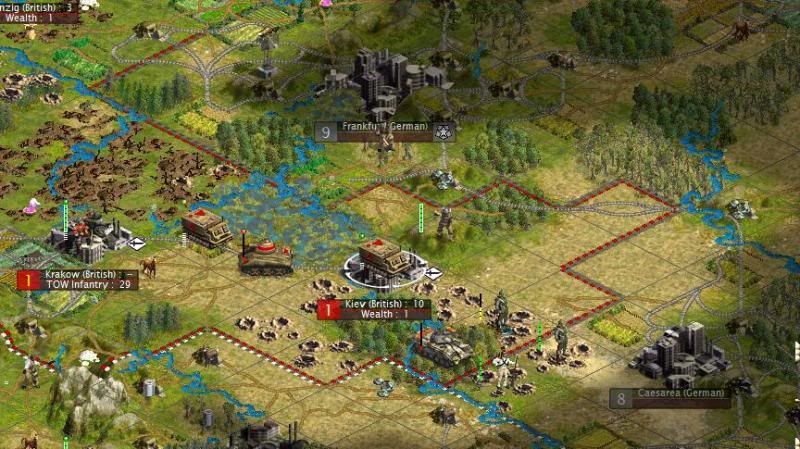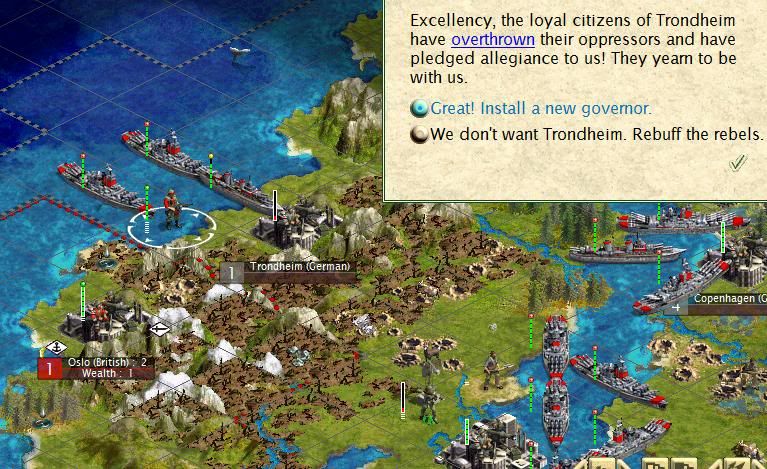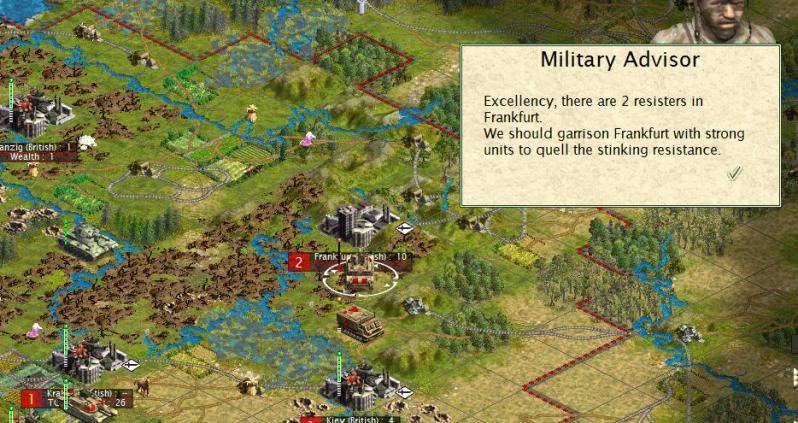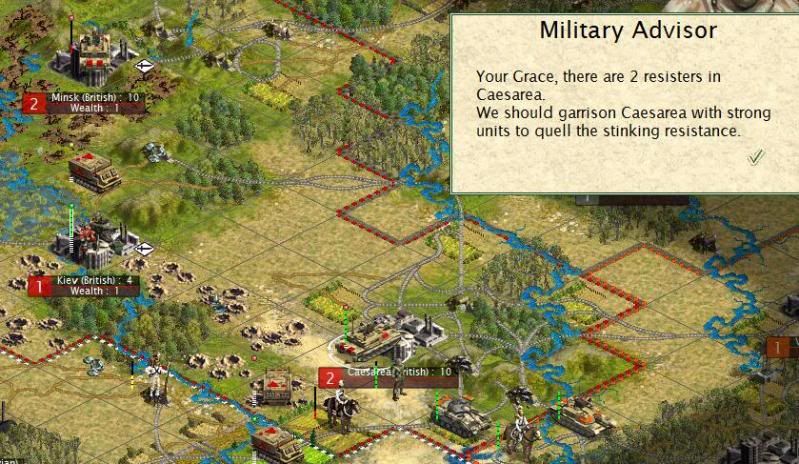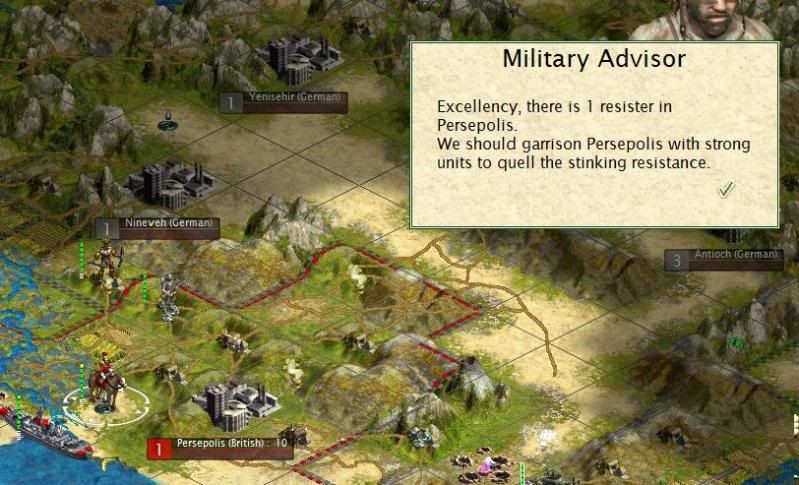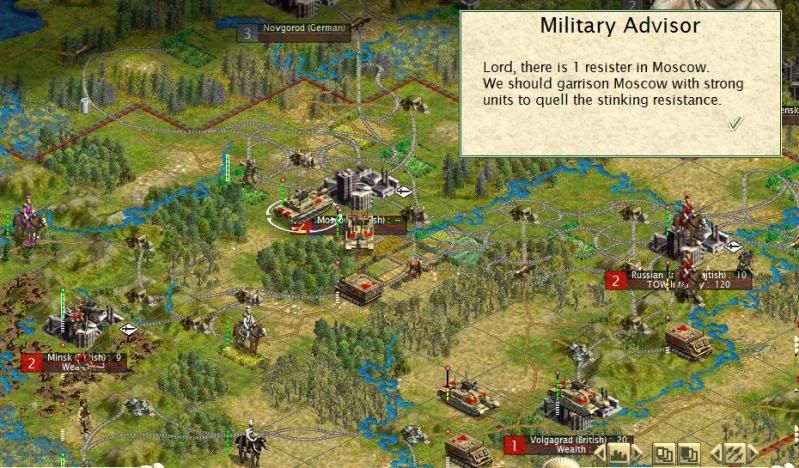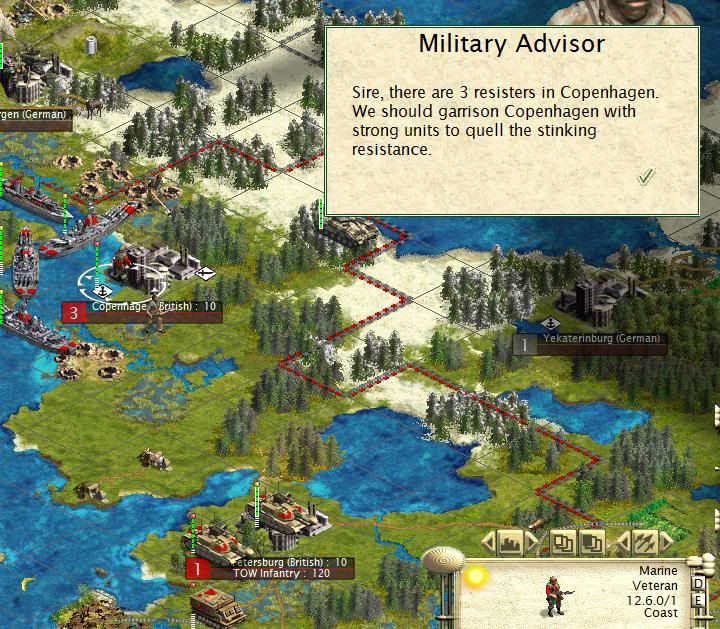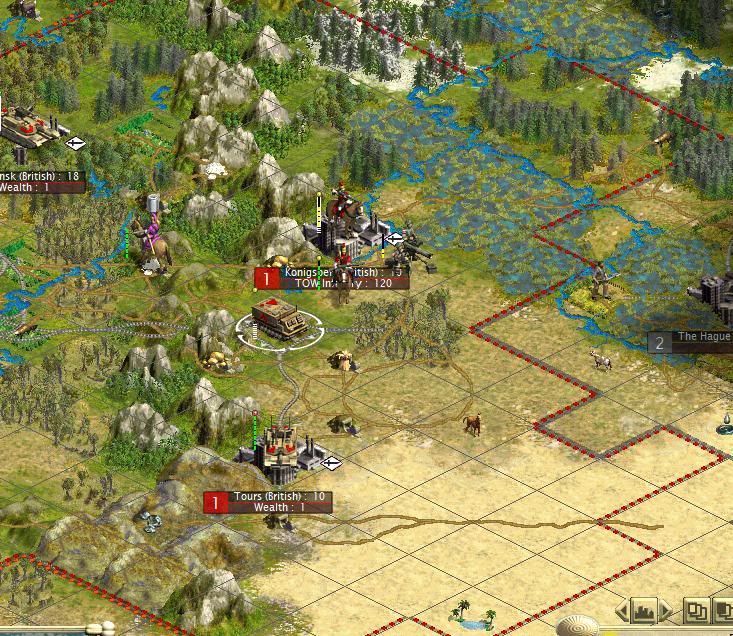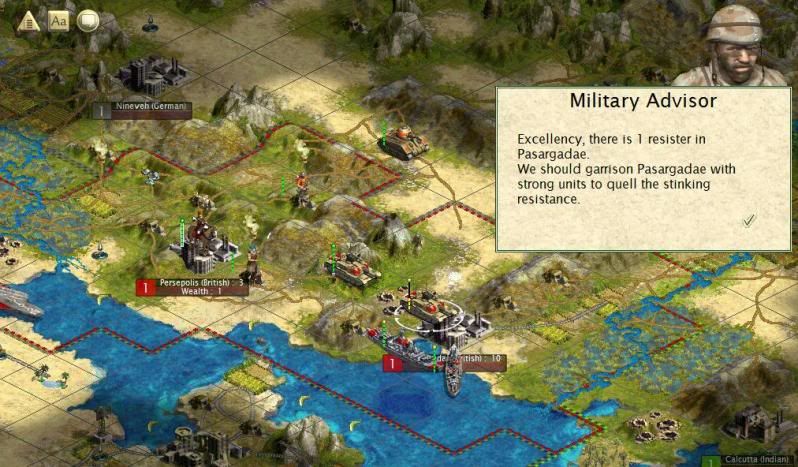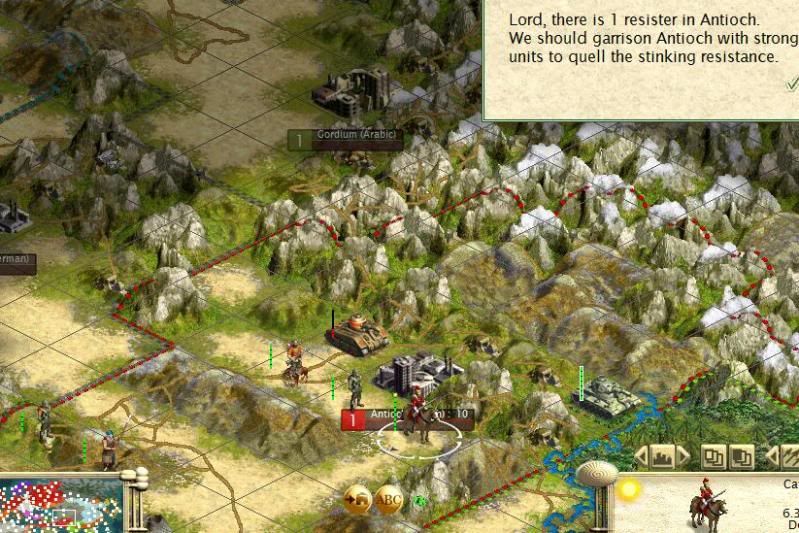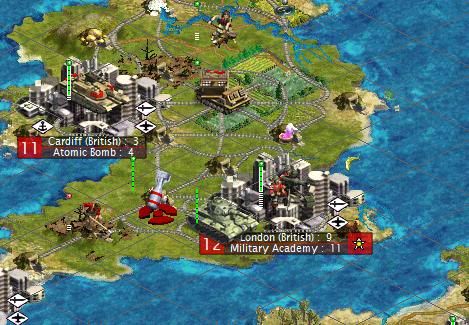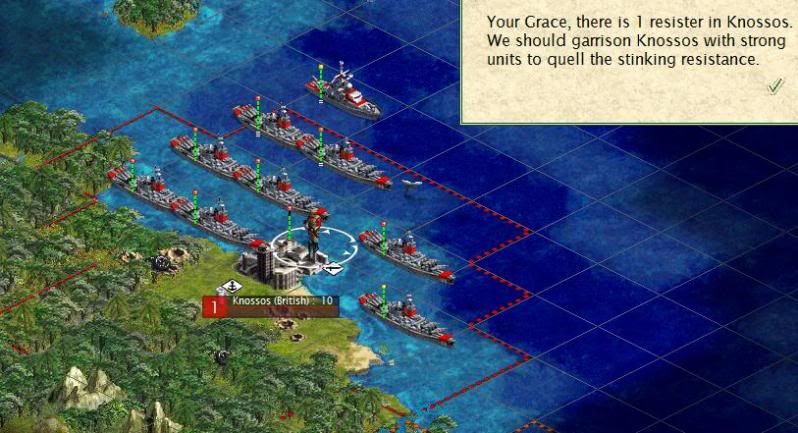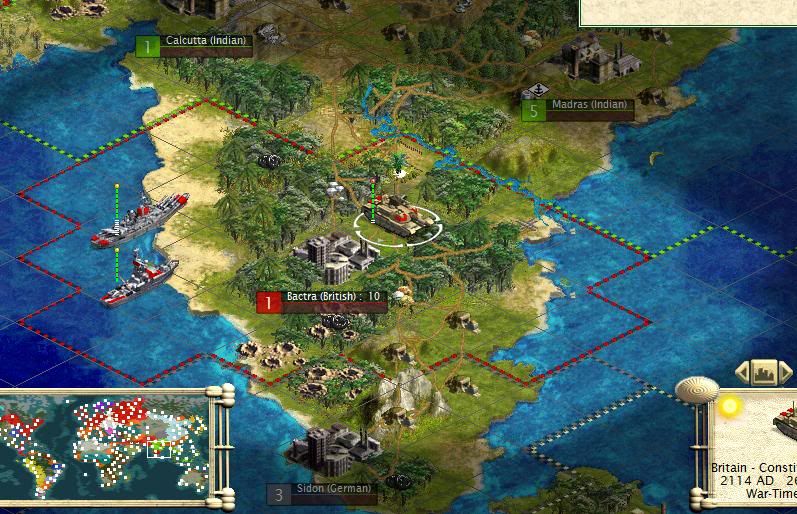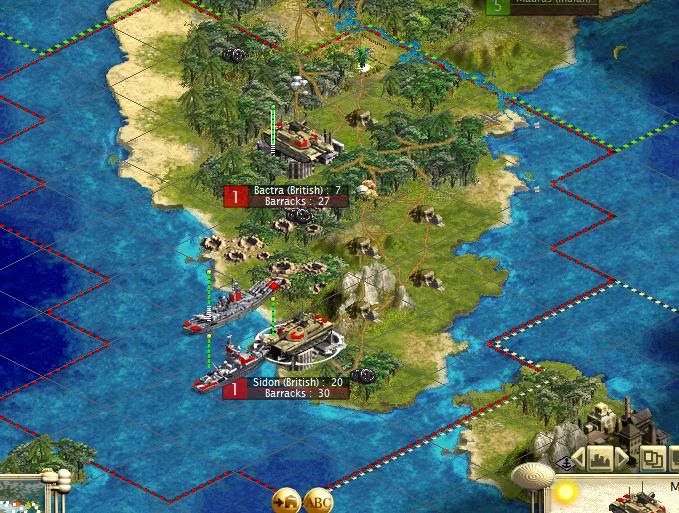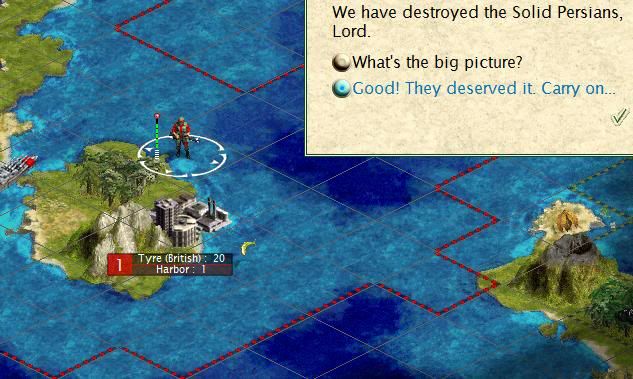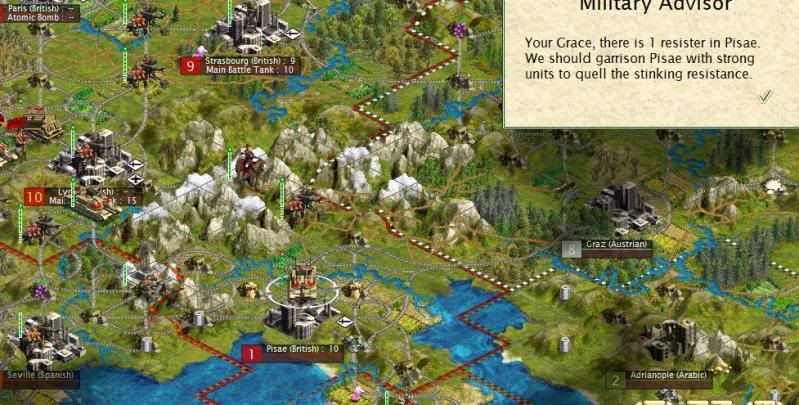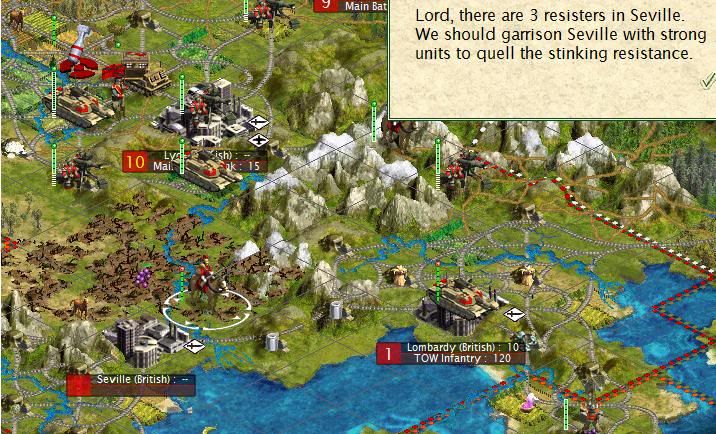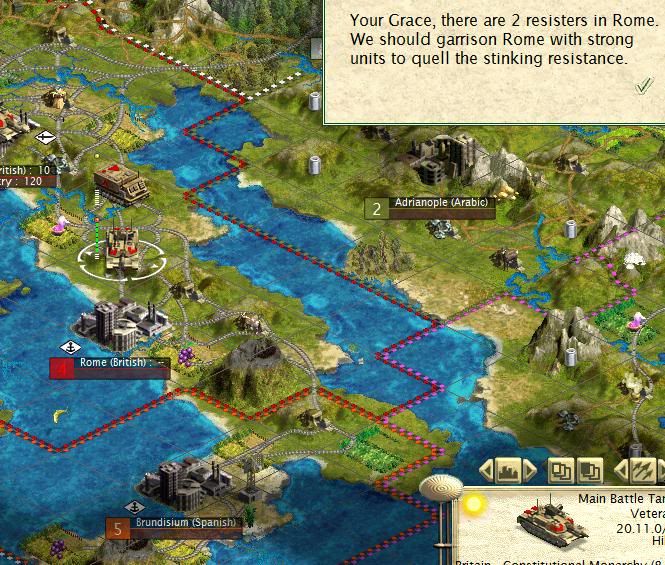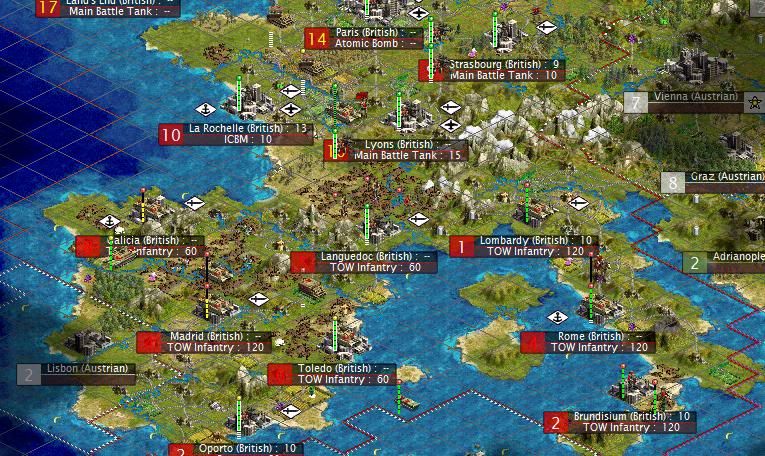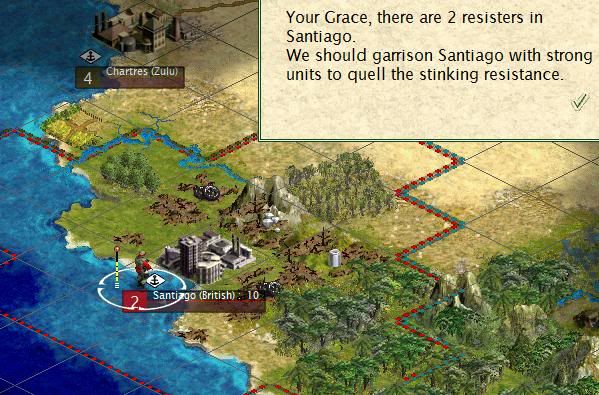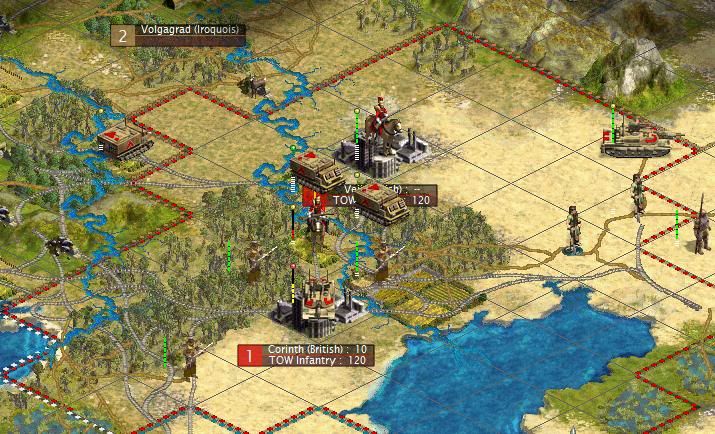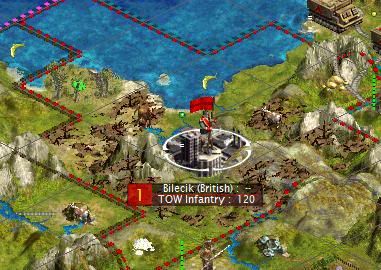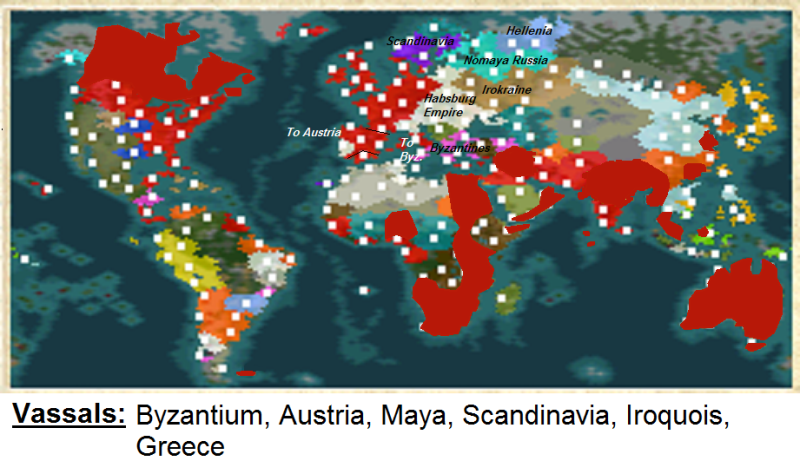Tani Coyote
Son of Huehuecoyotl
- Joined
- May 28, 2007
- Messages
- 15,195
Chapter XI: Nuclear War
I'm gonna hate this variant... so much conquered land and I have to give it all away.
Spoiler :
2086, the War Ministry offered targets:
Hamburg, a city of 3.25 million people. Home to the traitor Shakespeare's Theater and the United Nations. Largest city in the German Empire.
Berlin, capital of Germany and historical epicenter of their power. Home to countless wonders as a result of Germany's historical technological superiority. Taking the city would push the front lines back far to the east. 600,000 people.
Rotterdam. Positioned on the Straits between the Baltic and North Seas, control of this city would damage German shipping. 600,000 people.
The overall strategy proposed by the War Ministry was the complete isolation of Germany by getting every nation to attack them; this would divert Germany's resources across several fronts. In addition, ports were to be given priority for attack; the destruction or capture of German harbors would cut them off. The War Ministry also desired the annihilation of Germany's two sources of Uranium, one in Sweden and the other in the former Persia, along the Indian border.
War was declared in 2090 CE. Aircraft carriers off the coast of India began shelling their eastern territories, while the navy, airforce, and almost the entire military assaulted the continent.
India, Byzantium, and Austria were easily swayed. The Arabs concurred with the conflict, but they required aluminum if they were to compete with Germany; Britain provided in exchange for a declaration.
Before long, the entire world had joined forces with Britain against Germany. Now Britain had to play its trump card.
The three bombs all hit their targets, killing over half the people in each city and destroying large amounts of infrastructure and troops. German Uranium deposits were destroyed in a fourth strike, ensuring that they wouldn't be able to return fire.
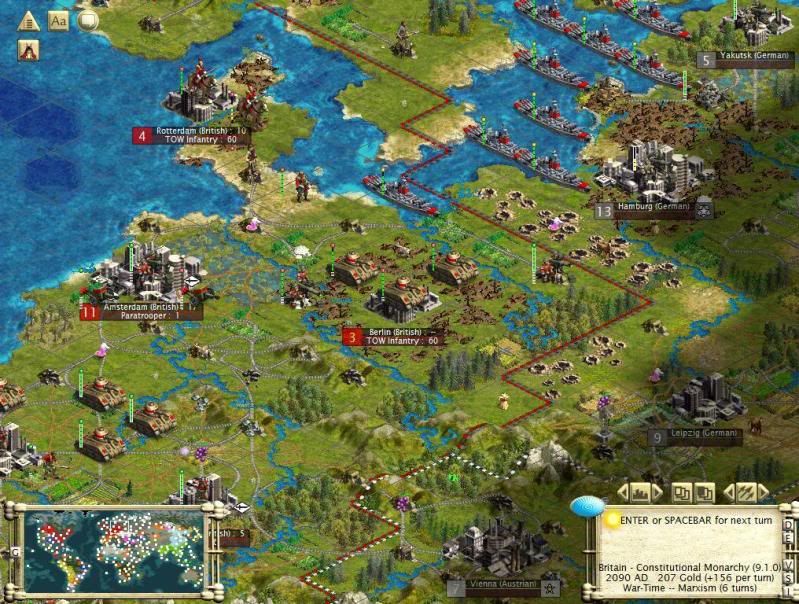
Berlin and Rotterdam were both taken, damaging Germany's standing in Europe immensely. With the fall of the cities, all roads leading to Berlin outside Britain's borders were obliterated; this would eliminate the chance of a Panzer counteroffensive.
In the Middle East, care was taken to destroy all German oil wells, so as to stop Panzer production there and thus give the Allies in the region an edge.
2091, the Mongols were destroyed by Byzantium, allowing the many anti-Mongol nations to focus on Germany.
The German "counteroffensive" was a failed naval strike, resulting in one less German vessel preying upon British shipping.
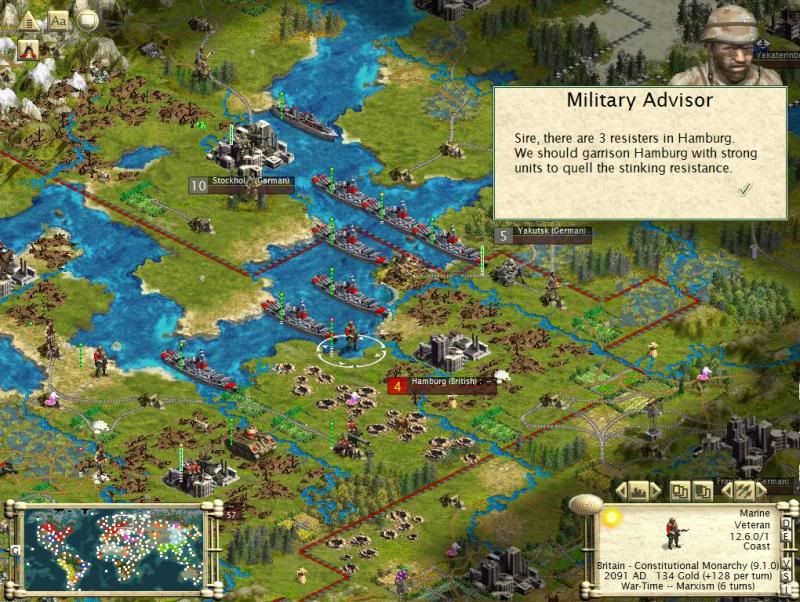
After dropping another nuclear bomb on the city of Hamburg and once more halving its population, the city was left empty of a garrison, the few German troops left abandoning it. Marines and a large force of TOW Infantry conquered it, fortifying it for the inevitable German counteroffensive.
2092, America and the Iroquois formed a coalition against the Aztecs.
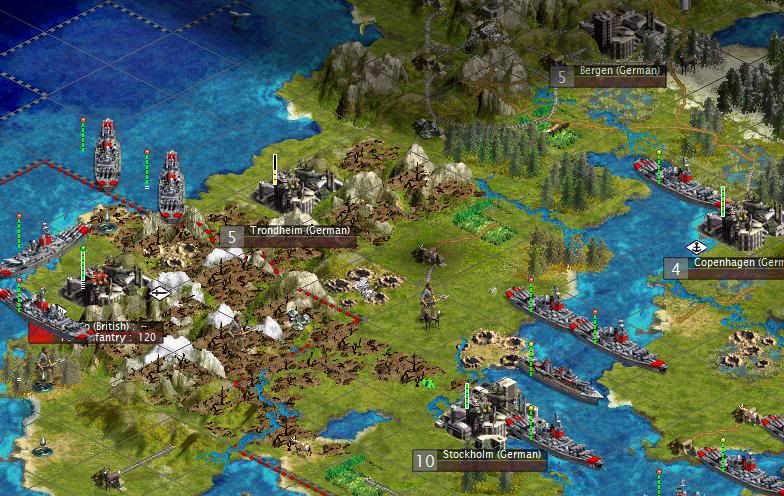
Two more atomic bombs were dropped on Norway, destroying expensive infrastructure and severing one source of oil.
After that, the new Radar Artillery divisions were given orders to use the Austrian rail network to hit any German units or cities they could, so as to soften the front and prevent a possible flank from opening.
2097, the works of a German man named Marx were published throughout the world due to British publishing efforts. Considered a radical, his works were never published under German rule, but now, they were appearing everywhere, with Britain collecting the royalties. Spaniards and Arabs had the most interest, and the treasury was flooded with cash as a result of worldwide publishing.
An Age of Science was soon entered as well, due to other breakthroughs.
Three German Panzer groups were annihilated within Austrian territory, due to the railway system(partly constructed by British workers) allowing rapid deployment of artillery. While the spies in Frankfurt had been captured and executed twice in a row, this was a breakthrough, given that the last time German forces were known, only 33 Panzer groups existed. And with the destruction of the last source of German oil in occupied Russia, it would be some time before new ones were built.
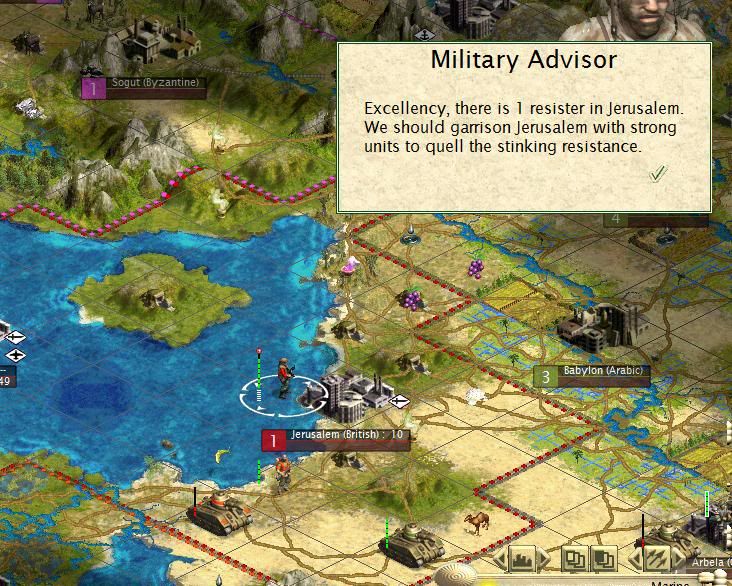
The conquest of Jerusalem in 2098 marked the resuming of Germany's destruction. The Temple Mount was captured without damage despite a nuclear bomb dropping in the waters outside the city. Many people found themselves relieved that the war was going well anew, and that the Holy Land was now in British hands. As a result, many were far less inclined to resist the government.
While plans were made to turn the occupied zones of Germany to friendly powers, Jerusalem was to be kept as a vital middle-eastern base. This would be the same fate to await the region of Kuwait if captured; it would allow Britain to split Arabia off from the rest of the ME and thus hold it hostage.
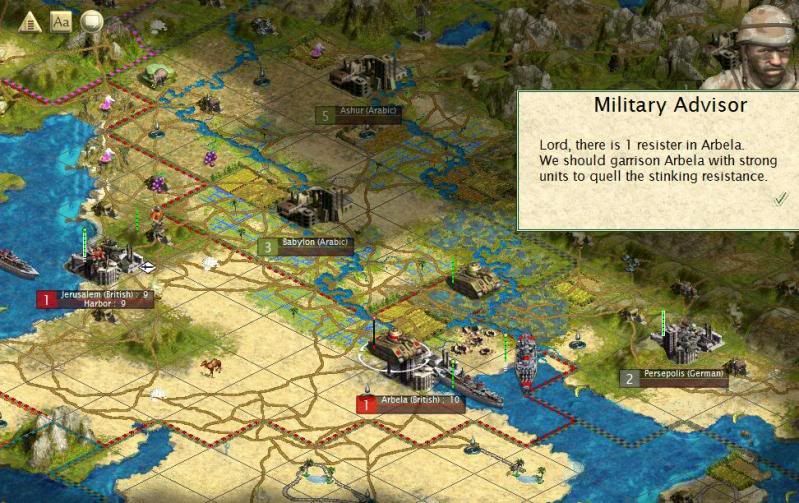
The fall of Arbela in 2099 was another victory for Britain. It was hoped the Germans didn't have any nearby troops to use against the weakened defenders.
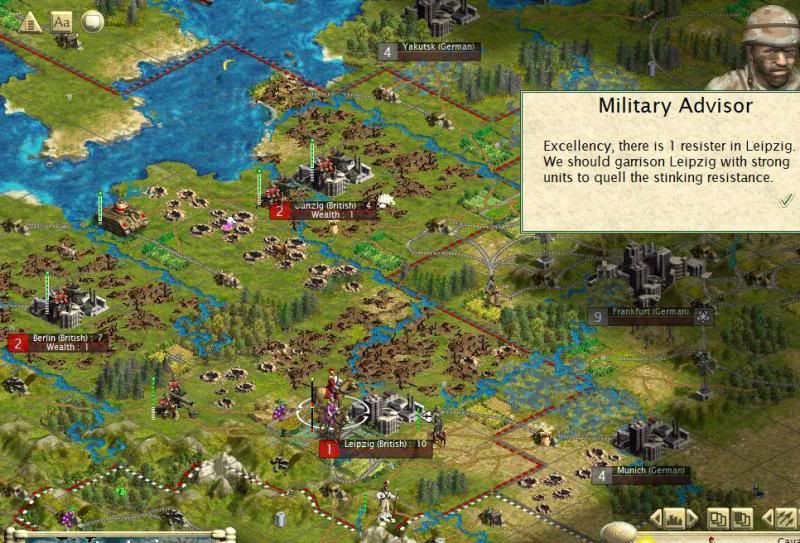
The fall of Leipzig put much of the Polish lands under British rule. If Frankfurt and Munich were captured, Germany would have lost its homeland and would be ripe for the picking.
Hamburg, a city of 3.25 million people. Home to the traitor Shakespeare's Theater and the United Nations. Largest city in the German Empire.
Berlin, capital of Germany and historical epicenter of their power. Home to countless wonders as a result of Germany's historical technological superiority. Taking the city would push the front lines back far to the east. 600,000 people.
Rotterdam. Positioned on the Straits between the Baltic and North Seas, control of this city would damage German shipping. 600,000 people.
The overall strategy proposed by the War Ministry was the complete isolation of Germany by getting every nation to attack them; this would divert Germany's resources across several fronts. In addition, ports were to be given priority for attack; the destruction or capture of German harbors would cut them off. The War Ministry also desired the annihilation of Germany's two sources of Uranium, one in Sweden and the other in the former Persia, along the Indian border.
War was declared in 2090 CE. Aircraft carriers off the coast of India began shelling their eastern territories, while the navy, airforce, and almost the entire military assaulted the continent.
India, Byzantium, and Austria were easily swayed. The Arabs concurred with the conflict, but they required aluminum if they were to compete with Germany; Britain provided in exchange for a declaration.
Before long, the entire world had joined forces with Britain against Germany. Now Britain had to play its trump card.
The three bombs all hit their targets, killing over half the people in each city and destroying large amounts of infrastructure and troops. German Uranium deposits were destroyed in a fourth strike, ensuring that they wouldn't be able to return fire.

Berlin and Rotterdam were both taken, damaging Germany's standing in Europe immensely. With the fall of the cities, all roads leading to Berlin outside Britain's borders were obliterated; this would eliminate the chance of a Panzer counteroffensive.
In the Middle East, care was taken to destroy all German oil wells, so as to stop Panzer production there and thus give the Allies in the region an edge.
2091, the Mongols were destroyed by Byzantium, allowing the many anti-Mongol nations to focus on Germany.
The German "counteroffensive" was a failed naval strike, resulting in one less German vessel preying upon British shipping.

After dropping another nuclear bomb on the city of Hamburg and once more halving its population, the city was left empty of a garrison, the few German troops left abandoning it. Marines and a large force of TOW Infantry conquered it, fortifying it for the inevitable German counteroffensive.
2092, America and the Iroquois formed a coalition against the Aztecs.

Two more atomic bombs were dropped on Norway, destroying expensive infrastructure and severing one source of oil.
After that, the new Radar Artillery divisions were given orders to use the Austrian rail network to hit any German units or cities they could, so as to soften the front and prevent a possible flank from opening.
2097, the works of a German man named Marx were published throughout the world due to British publishing efforts. Considered a radical, his works were never published under German rule, but now, they were appearing everywhere, with Britain collecting the royalties. Spaniards and Arabs had the most interest, and the treasury was flooded with cash as a result of worldwide publishing.
An Age of Science was soon entered as well, due to other breakthroughs.
Three German Panzer groups were annihilated within Austrian territory, due to the railway system(partly constructed by British workers) allowing rapid deployment of artillery. While the spies in Frankfurt had been captured and executed twice in a row, this was a breakthrough, given that the last time German forces were known, only 33 Panzer groups existed. And with the destruction of the last source of German oil in occupied Russia, it would be some time before new ones were built.

The conquest of Jerusalem in 2098 marked the resuming of Germany's destruction. The Temple Mount was captured without damage despite a nuclear bomb dropping in the waters outside the city. Many people found themselves relieved that the war was going well anew, and that the Holy Land was now in British hands. As a result, many were far less inclined to resist the government.
While plans were made to turn the occupied zones of Germany to friendly powers, Jerusalem was to be kept as a vital middle-eastern base. This would be the same fate to await the region of Kuwait if captured; it would allow Britain to split Arabia off from the rest of the ME and thus hold it hostage.

The fall of Arbela in 2099 was another victory for Britain. It was hoped the Germans didn't have any nearby troops to use against the weakened defenders.

The fall of Leipzig put much of the Polish lands under British rule. If Frankfurt and Munich were captured, Germany would have lost its homeland and would be ripe for the picking.
I'm gonna hate this variant... so much conquered land and I have to give it all away.


